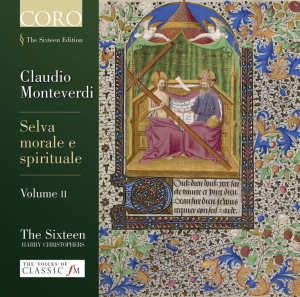On Trinity 24, our choir sang the Sanctus, Benedictus, and Agnus Dei from a Mass by Claudio Monteverdi (1567-1643) published in 1641 (see here for more about the historical significance of Monteverdi’s work). The Messa da Capella a quattro voci is a relatively late work by Monteverdi, and it demonstrates how he was able to write music that sustained the rich polyphonic textures of previous generations of composers (employing the “Stile antico”) even as he pioneered the innovative musical techniques of the early Baroque.
This Mass was part of a collection called Selva morale e spirituale, “A moral and spiritual forest.” In the words of conductor Harry Christophers, “It is jam packed with brilliant works, from solo songs to thrilling eight-part vocal pieces with added strings; every composition is full of luscious harmonies, beautifully constructed for all concerned.”
With his versatile choral ensemble, The Sixteen, Christophers has recorded these works on a three-volume set released between 2010 and 2013. All three volumes (available on CD and as digital downloads) are invigorating listening, but here I’ll focus on Volume II, because it includes the recording of the Mass.
 As a foretaste of the treats on this recording, the volume opens with Laudate Dominum (Terzo), the third of three settings of two verses from Psalm 117, a text which begins “O praise the Lord, all ye nations: praise him, all ye people.” Monteverdi’s setting, scored for eight voices, displays his dramatic flair, as the call to praise is initially voiced by two sopranos in close harmony. Christophers has noted that “Monteverdi stretches every singer’s versatility to the limit,” and you hear some of that stretching very nimbly demonstrated by sopranos Elin Manahan Thomas and Grace Davidson in the opening measures. After they’ve sung the first phrase, “Laudate dominum omnes gentes,” the other voices (apparently representing the people being urged to praise God) sing slowly the single word “quoniam,” “Because,” expressed almost as a question, as if they’re asking these angelic voices why praise should be so rendered.
As a foretaste of the treats on this recording, the volume opens with Laudate Dominum (Terzo), the third of three settings of two verses from Psalm 117, a text which begins “O praise the Lord, all ye nations: praise him, all ye people.” Monteverdi’s setting, scored for eight voices, displays his dramatic flair, as the call to praise is initially voiced by two sopranos in close harmony. Christophers has noted that “Monteverdi stretches every singer’s versatility to the limit,” and you hear some of that stretching very nimbly demonstrated by sopranos Elin Manahan Thomas and Grace Davidson in the opening measures. After they’ve sung the first phrase, “Laudate dominum omnes gentes,” the other voices (apparently representing the people being urged to praise God) sing slowly the single word “quoniam,” “Because,” expressed almost as a question, as if they’re asking these angelic voices why praise should be so rendered.
The sopranos come back with a florid repeating of the single-word call to praise. After the lower voices ask again, “quoniam?” The angels (let’s just call them that for now; the drama demands it) explain, now singing in a very simplified style, “Quoniam confirmata et super nos misericordia ejus, et veritas Domini manet in aeternum,” “because his mercy is confirmed upon us, and the truth of the Lord endureth for ever.” The text is then bounced back and forth between the sopranos and the other voices, until all eight voices join in a rich and complex affirmation of praise and its rationale. The piece closes with just the two sopranos singing the traditional text of the Gloria Patri (“Glory be to the Father and to the Son, etc.), closing with a quiet, delicate Amen.
In addition to the setting of the Mass on this recording, there are eleven other pieces, including a virtuoso bass solo, Ab aeterno ordinata sum, “I was set up from everlasting,” a text from Proverbs 8:23-31 describing the birth of Wisdom (a text which had also been associated with the Virgin Mary); a delicate and charming soprano solo, Sanctorum Meritis, which is a four-stanza hymn celebrating the faithfulness of martyrs (“the heart swells to exalt in song this, the noblest race of victors”); and a dramatic and rousing setting of Psalm 110, Dixit Dominus (“The Lord said unto my Lord . . .” ), a text frequently set by Renaissance and Baroque composers.
Harry Christophers writes that this music is both demanding and exhilarating for singers. It is certainly exhilarating for listeners, and worth taking the time for attentive listening. One good reason to buy recordings instead of always exploiting various streaming services is to be able to follow the text in the accompanying booklets. The sound of the music alone is exhilarating, but the texts and their significance still matter.
Until you purchase this recording, here’s the performance of Dixit Dominus (Primo) from volume II of Selva morale e spirituale sung by The Sixteen.